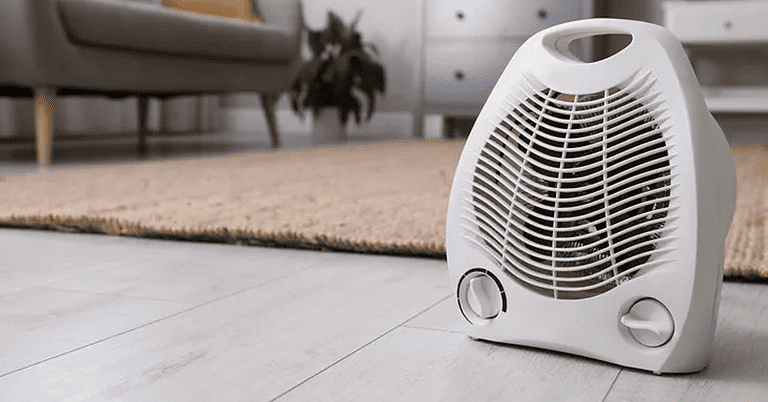How Many Watts Is A Space Heater
You’re probably curious about your space heater’s power consumption. It’s a common question, particularly when managing your energy bills.
Most heaters use around 1,500 watts from a standard outlet, but what does that mean for you? In this article, we’ll explain the specifics and help you understand how much it costs to run a space heater in your home.

An Introduction to Space Heater Use and Wattage
In this discussion, you’ll grasp some key terms related to space heaters and their energy usage. You’ll understand what a ‘watt’ is, how it relates to electricity, and its significant role in the operation of space heaters.
Recognizing the importance of wattage in these devices helps you choose an efficient heater and gives insight into its power consumption and potential impact on your electricity bill. (Read Can You Plant Shrubs In The Fall)
Defining Key Terms: Watt, Electricity, Space Heaters
You’ll need to know that a watt is a power unit that measures the energy transfer or conversion rate. It’s especially relevant when discussing how much electricity space heaters use. Your space heater’s heating element consumes watts of electricity to generate heat. Typically, these appliances use about 1500 watts.
Electricity consumption is calculated as ‘watts x hours used,’ measured in kilowatt-hours (kWh). The cost depends on your electricity rate per kWh. For instance, if you run a 1500-watt heater for an hour, it uses 1.5 kWh. If your electricity rate is $0.12 per kWh, the cost would be $0.18 per hour.
Always check the rated power in watts before buying to determine its potential impact on your electric bill.
The Importance of Understanding Wattage in Space Heaters
Grasping the wattage of your heating device is crucial as it directly impacts your electricity bill. Understanding wattage in space heaters helps you gauge how many watts a space heater uses and its effect on energy consumption.
The average space heater operates at around 1500 watts, varying depending on the model and setting. It’s essential to check the space heater rating for an accurate understanding of wattage. Remember, higher wattage means more heat output and more power consumed.
Therefore, a device with many watts will use a significant amount of electricity. So when deciding ‘how many watts a space heater needs,’ consider both desired warmth and anticipated energy cost to ensure efficient usage of your heating device.

How Many Watts Does a Typical Space Heater Use
You’re about to delve into the intriguing world of space heater wattage. We’ll explore variations in different types of heaters and help you understand how electric space heater wattage works.
We’ll discuss how size impacts a heater’s performance and energy consumption, comparing small space heaters with their larger counterparts. With this knowledge, you’ll be better equipped to decide when to choose your next space heater. (Read Effective Wasp Control)
Wattage in Different Types of Space Heaters
Different types of space heaters can vary in wattage, typically ranging from 500 to 1500 watts. It’s important to remember that a heater with higher wattage will provide more heat but also consume more electricity. So, when you’re asking ‘how many watts is a space heater,’ the answer depends on the type and size of the space heater.
Some smaller models might use as little as 500 watts, while larger ones can use up to 1500 watts. When choosing a space heater, consider your room size and your desired heat. Remember that not all space heaters on the market are created equal. A larger model might seem to warm your room faster, but it could lead you to spend more on electricity bills in the long run.
Understanding Electric Space Heater Wattage
Understanding how much power your electric heating unit consumes and the consequent effect on your energy bills is essential. The space heater’s wattage varies, usually between 600 to 1500 watts. Understanding electric space heater wattage can help you determine the electricity a space heater uses.
Usually, heaters use different amounts of power depending on their size; a small space heater use could be as low as 600 watts, while larger space heaters consume up to 1500 watts. Remember, the higher the wattage, the more electricity it uses and, consequently, more impact on your energy bill. Therefore, when choosing a space heater for your needs, consider its heating capacity and power consumption.
The Impact of Size: Small Space Heater Vs. Larger Space Heater
When comparing the impact of size on power consumption, smaller heating devices tend to be more energy-efficient than their larger counterparts. Small space heaters typically consume fewer watts, making them ideal for smaller rooms. A large space heater, capable of warming more extensive areas, uses significantly more energy.
You may ask, ‘How many watts is a space heater?’ Well, it varies greatly. Many space heaters operate at around 1500 watts, but there’s quite a range based on size and efficiency. The room size you’re trying to heat plays a pivotal role in choosing the ideal space heater; small heaters are perfect for confined spaces, whereas larger ones suit expansive areas better. (Read Water Pooling On Composite Deck)

How Much Electricity Does a Space Heater Consume
In this discussion, you’ll delve into how much electricity a space heater consumes. You’ll analyze the cost implications of operating a space heater, understanding what factors influence its electricity usage, such as size, power rating, and efficiency.
Furthermore, we will explore averages and variations in space heater energy consumption to give you a comprehensive view of their impact on your electricity bill.
Analyzing the Electricity Cost of Operating a Space Heater
Operating a space heater can significantly impact your electricity bill. They typically use about 1,500 watts of power. You’ll need to know the wattage and how long you’ll run it to determine the electricity cost. For instance, running a space heater for eight hours consumes around 12kWh daily. The average cost of electricity in the U.S.U.S. is approximately $0.13 per kWh, so that’s about $1.56 per day. Annually, this amounts to over $569! Understanding the amount of electricity a space heater uses is crucial when considering its impact on your electricity bill.
Factors Influencing the Electricity Usage of Space Heaters
There are a variety of factors that can influence how much electricity a heating device uses. These factors include its size, energy efficiency, and the desired heat output. The wattage of a space heater indicates how many watts it uses per hour. Typically, space heaters come in capacities ranging from 400 to 1,500 watts.
Several factors can influence the electricity usage of space heaters. These factors include the room size, insulation level, and outside temperature. Running your space heater at total capacity consumes more power, which can increase your energy bills.
To reduce the cost of operating a space heater, it’s essential to use it judiciously. This can be done by adjusting its thermostat and using it only when necessary. Additionally, using energy-efficient models is recommended as they have lower power consumption.
Averages and Variations in Space Heater Electricity Consumption
You’d be surprised at the variety in electricity consumption among different models of heating devices, with some being more efficient than others. On average, an electric space heater uses around 1500 watts. However, this can vary depending on the model and its settings.
If you were to run a typical space heater for a month straight, it would consume about 1080 kWh of electricity. Naturally, this leads to variations in the cost of running these devices due to differences in energy efficiency and the fluctuating price of electricity in different areas. Energy-efficient space heaters are designed to use less power while providing the same amount of heat, which can significantly reduce your energy bills over time. (Read Will Propane Tanks Explode From Cold)

Cost Analysis: How Much Does It Cost to Run a Space Heater
You’ve likely pondered the implications of running a space heater for 24 hours, specifically regarding power usage and cost. It’s crucial to consider your electricity costs to understand precisely how much it’ll set you back to run such a heater.
There’s also merit in comparing the expenses associated with using a space heater versus those tied to central heating. This can help you make more informed decisions about managing your home’s climate.
Running a Space Heater for 24 Hours: The Power and Cost Factor
Running a 1,500-watt space heater for an entire day would consume around 36 kWh of electricity, costing about $5.04 based on the average U.S. electricity rate. This calculation shows how much it costs to run your space heater for hours at a time.
Remember that this is just an estimate; the actual cost could be higher or lower depending on your local electricity cost. If you’re pondering running a space heater for 24 hours straight, consider safety and energy consumption concerns, not just the average price.
You can estimate how much the continuous use might add to your energy bill, but remember: it’s generally more efficient and safe to use space heaters sparingly than constantly keep them running.
Considering Electricity Cost: How Much Does It Cost to Run a Heater
Moving on from understanding how much power a space heater uses, let’s delve into the cost implications of running one. You may ask, ‘How much does it cost to run a space heater?’ The answer lies in your monthly electric bill.
To calculate this, you’d multiply the electricity the space heater consumes (in kilowatt-hours) by your local rate per kilowatt-hour. For instance, if you run a 1,500-watt heater for 8 hours daily, it would consume about 12 kWh per day. Considering an average cost of $0.13 per kWh, your daily usage would add roughly $1.56 to your bill.
Hence, considering electricity costs is crucial when deciding how long to use a space heater and which model to choose.
Comparison of Cost: Space Heater Vs. Central Heating
It’s essential to compare the cost of using a central heating system versus a space heater, as this can significantly affect your monthly energy expenditure.
When comparing the space heater vs. central heating cost, consider your electric bill per kWh and how much power each system consumes. On average, using a space heater in smaller areas or for shorter periods could be cheaper. Your energy bill will show how much you pay per kWh; running a decent space heater for a month typically consumes fewer kWh than central heat.
However, remember that efficiency varies – some space heaters can also use less energy than others due to advanced technology or design features. Therefore, always factor in these considerations when choosing between heating options.
Does a Space Heater Use a Lot of Electricity
You’ve heard a lot about space heaters and their energy consumption, but what’s myth and fact? It’s time to delve into the technical details of the environmental impact of these devices. We’ll guide you through understanding their energy efficiency, debunk common misconceptions, and provide tips for using space heaters to lower your energy consumption effectively.
Energy Consumption of Space Heaters: Myths and Facts
Contrary to popular belief, not all space heaters consume the same energy. Their wattage can range from 500 to 1500 watts depending on the model and heat output desired. To figure out how many watts a heater uses, check its specifications. A ceramic heater usually consumes less energy than others, with an average electricity usage of about 1,500 watts.
The heat setting you choose also affects the energy consumption of space heaters. If you use it for several hours daily, it will consume a lot of electricity.
Energy Efficiency: Are Space Heaters Bad for the Environment
When considering the environmental impact, you’ll find that certain types of heaters can be quite taxing on our planet. If you want to heat a small space efficiently and affordably, an energy-efficient space heater might be your best option.
These units work by directly heating the cold air in a confined area rather than wasting energy to warm up a larger space. They typically cost a few cents per hour to run and are highly effective at maintaining comfortable temperatures in targeted areas.
However, remember that environmental efficiency extends beyond just power usage. It would be best to consider how much waste is produced during the manufacturing and disposal of these heaters before making your final decision.
Innovative Use of Space Heaters: Tips for Lower Energy Consumption
It’s essential to use your heating devices wisely to minimize energy consumption and save on electricity bills. First, ensure you use a space heater with an Energy Star rating for maximum efficiency.
Consider the size of your room before setting the heater’s power level; smaller rooms require less wattage than larger ones. Regulate usage by turning off the heater when not in use or reduce its running time with a programmable timer.
Optimize insulation in your home to lessen heat loss and enhance overall efficiency. Lastly, consider using renewable energy sources like solar panels to power your heaters, reducing reliance on fossil fuel-generated electricity and lowering your carbon footprint simultaneously.

Concluding Thoughts: Is a Space Heater Right for You
As you weigh the cost of running a space heater, it’s crucial to ask: Is it worth it? This discussion will help you determine who should and shouldn’t use a space heater based on lifestyle needs, room size, and budget.
Weighing the Cost of Running a Space Heater: Is It Worth It
You must weigh the cost of running a space heater and decide if it’s worth the potential energy savings. Remember that most heaters use about 1,500 watts of electricity per hour. Your cost will depend on your local kWh rate; for instance, if you pay $0.12 per kWh, running your heater for one hour will cost around $0.18.
But don’t forget safety considerations—don’t run your heater continuously or unattended due to the risk of overheating and fire hazards. Energy-efficient models can help reduce costs while providing adequate heat output.
Who Should and Shouldn’t Use a Space Heater
While they’re not for everyone, specific individuals might find a warming device particularly beneficial. If you’re living in a drafty old house or an apartment with inadequate heating, space heaters provide an affordable solution to supplement your primary heat source. You’ll appreciate the extra warmth in rooms that remain chilly despite central heating.
However, if you have kids or pets who might knock over the heater, it’s best to consider alternatives due to safety concerns. Space heaters can cause fires if not used properly.
If you’re environmentally conscious and concerned about power consumption, remember that space heaters are energy-intensive devices. Opting for energy-efficient models or exploring other heating options such as insulation improvement or solar panels could be more suitable for your needs.
Conclusion: Understanding Electrical Use for Informed Decision-Making
In conclusion, you must be clear on how much electricity your appliances use to make informed decisions about their usage. Understanding the wattage of your space heater, for instance, is crucial. If it uses 1,500 watts and runs eight hours a day, it consumes 12 kWh daily. To figure out the cost, multiply this by your local electricity rate.
Remember: watts equal amps times volts. So, if your heater draws 12.5 amps at 120 volts, it operates at high power levels – consuming more energy and raising costs. To minimize expenses and environmental impact without sacrificing comfort, consider energy-efficient models or alternative heating options like solar panels or lithium-ion batteries during off-peak hours.







